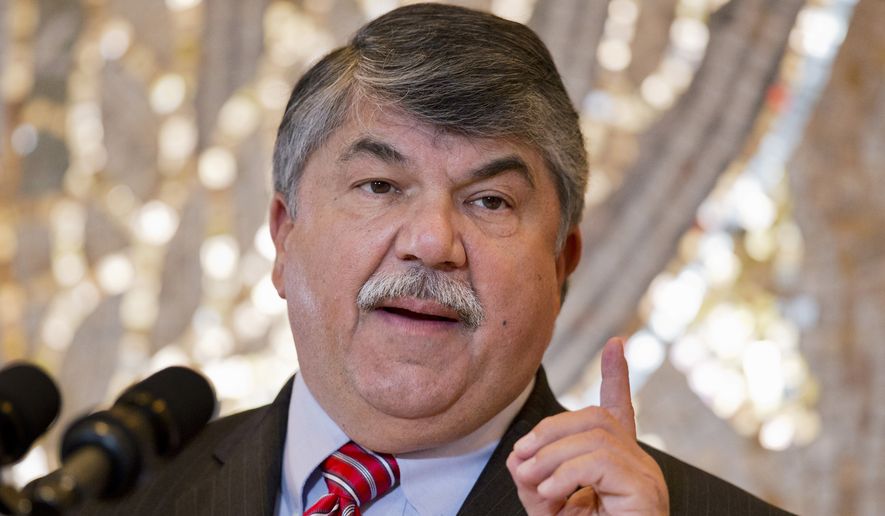President Obama faces his second veto test from the Republican-controlled Congress after the House gave final approval Thursday to a bill that kills the National Labor Relations Board’s “ambush election” rule that speeds workplace votes on unionization.
House Republicans heralded it as a pro-worker bill and called on Mr. Obama to rethink the veto threat he made after the Senate passed the measure last month.
But Mr. Obama, who repeatedly has disappointed union bosses who twice helped him win the White House, is poised to use his veto pen to deliver on one of labor’s priorities.
Mr. Obama likely will prevail: The bill passed both chambers of Congress with far less than the two-thirds majority needed to override a veto.
The bill nixes a rule that would shorten the time between a union’s request to organize and a vote by employees from 38 days on average to as few as 11 days. Union organizers still could spend as much time as they want building support before petitioning for an election, which critics say sets up an ambush on employers.
The bill passed the House in a 232-186 vote split closely along party lines.
Just three pro-union Republicans — Reps. Peter T. King of New York, and Frank A. LoBiondo and Christopher H. Smith, both of New Jersey — joined all 183 Democrats in opposition to the bill.
Republicans said the rule, which is scheduled to take effect April 14, was designed by an NRLB stacked by Mr. Obama with pro-union members to help reverse shrinking union rolls by allowing workplace elections before businesses can make the case against unionizing.
Mr. Obama and his Democratic allies insisted that it would merely tweak the rules to simplify the process and prevent companies from beating unions with stalling tactics.
“The NLRB’s ambush election rule is another example of the Obama administration expanding Washington’s reach at the expense of American small businesses and workers. What is supposed to be a fair and neutral agency has instead become a tool for the administration to advance an agenda dictated by the president’s special interest allies,” House Speaker John A. Boehner, Ohio Republican, said after the bill passed.
“The ambush election rule the NLRB finalized last year will deny workers the opportunity to gather all the information they need before deciding whether to join a union,” Mr. Boehner said. “What’s worse, the rule will make all of their personal information — addresses, work schedules, email, phone numbers — available to union bosses without their consent, putting them at risk for harassment and identity theft.”
Union leaders took the opposite view.
AFL-CIO President Richard Trumka called the NRLB rule a “common-sense modernization” and Congress’ attempt to rescind it a “direct attack on workers and their right to be heard in the workplace.”
“President Obama is right in his commitment to vetoing this harmful legislation, and congressional Republicans should focus their efforts on lifting workers up instead of shutting them out,” Mr. Trumka said.
When issuing the veto threat, the White House called on Republicans to work with Mr. Obama.
“Instead of seeking to undermine a streamlined democratic process for American workers to vote on whether or not they want to be represented, the Congress should join the President in strengthening protections for American workers and giving them more of a voice in the workplace and the economy,” a White House statement said.
The legislation is among only a handful of bills to reach Mr. Obama’s desk in the first two months of the congressional session. Senate Democrats have filibustered a succession of bills.
This time, the bill slid through the Senate under a rarely used law that limits debate and prevents filibusters when Congress attempts to reject agency rules. It passed the Senate by a 53-46 vote, with only one Republican, Sen. Lisa Murkowski of Alaska, joining all 45 Democrats in voting no.
Mr. Obama has issued 17 veto threats since Congress convened in January with Republicans in control of the Senate as well as the House. Only one of the bills has escaped the bottleneck in the Senate to make it to his desk.
The president last month vetoed a bill to proceed with the long-stalled Keystone XL project that would complete an oil pipeline from Canada to Texas’ Gulf Coast, which faced staunch opposition from environmentalists. Mr. Obama wielded his veto pen despite a bipartisan 62-36 vote in the Senate, with nine Democrats supporting the bill.
“The presidential power to veto legislation is one I take seriously,” Mr. Obama said in a note to the Senate after vetoing the pipeline bill. “But I also take seriously my responsibility to the American people.”
The Senate failed an attempt to override the veto March 4 in a 62-37 vote, five votes short of the 67 needed.
• S.A. Miller can be reached at smiller@washingtontimes.com.




Please read our comment policy before commenting.